Gordon G. Chang's Blog, page 26
June 25, 2012
The US, China, Iran Oil Showdown
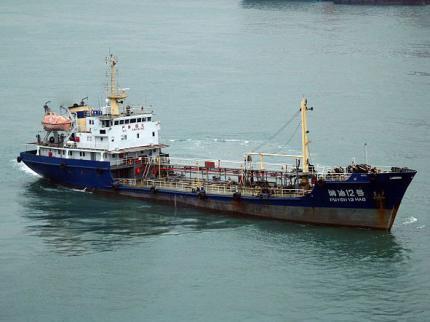
By Thursday, the State Department will have to decide whether to grant a waiver to China from the Iranian sanctions provisions of the National Defense Authorization Act for Fiscal Year 2012. It appears the State Department is on track to make the wrong decision.
The NDAA, as that legislation is called, attempts to reduce Iran’s revenue from the sale of petroleum by imposing sanctions on foreign financial institutions conducting transactions with Iranian financial institutions in connection with those sales. This provision, which essentially cuts off sanctioned institutions from the US financial system, takes effect on June 28th. As the Wall Street Journal notes, these measures are “an attempt to force other countries to choose between buying oil from Iran or being blocked from any dealings with the U.S. economy.”
The NDAA gives the president the power to exempt financial institutions from countries that have significantly cut back purchases of Iranian petroleum.
In March, the State Department announced renewable waivers for Japan and ten European countries. In the middle of this month, seven other countries—India, South Korea, Turkey, South Africa, Malaysia, Sri Lanka, and Taiwan—were waived. The one nation that still has not gotten a pass is the People’s Republic of China.
China, which has received American waivers in the past under other Iran legislation, had substantially decreased its purchases of Iranian oil earlier in the year. It appears the reduction was not due to an attempt to get a US waiver but because of a commercial dispute with Tehran. That dispute was settled in mid-February, and, as a result, the flow of Iranian oil to China picked up substantially.
In April, Iranian oil arrived at the rate of 388,034 barrels a day, according to Chinese customs data. That represented a drop of about 24 percent from the same month last year, but oil imports were up more than 48 percent from this March.
In May, China imported 521,936 barrels a day of Iranian oil. That was down 2.3 percent from last May, but up 34.5 percent from April.
The real numbers are probably higher than that. Iran has disabled ship tracking devices to disguise destinations, and sources indicate that many of the secret shipments have gone to Chinese ports. An unnamed Iranian official confirmed to Reuters that China is one of Iran’s two “lifters of last resort.” “We think China is taking most of the Iranian overhang and is keeping very quiet,” said an oil trading executive to the wire service.
Despite the uptick of Chinese purchases, Secretary of State Hillary Clinton hinted last week that she will grant a waiver to China. After noting that India, Japan, and South Korea had reduced purchases, she said, “We think, based on the latest data, that China is also moving in that direction.”
In fact, the latest data shows Beijing increasing its purchases from Iran. And this raises the question: What is the point of enacting sanctions if they are not imposed on the country that is Tehran’s largest oil customer and investor as well as its largest trading partner?
The Obama administration, unfortunately, is not willing to take those steps that can stop the Iranian nuclear program. The “atomic ayatollahs” will see the failure of American resolve and will act accordingly. And that will leave us no choice but to accept an Iranian bomb—or go to war.
Photo Credit: Pete
June 18, 2012
‘Marked for Life’ in North Korea
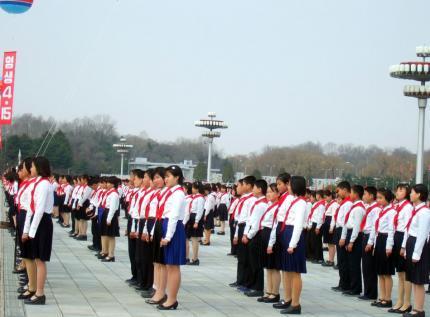
In North Korea, every individual, at birth, is assigned to one of 51 categories depending on his or her deemed trustworthiness and loyalty to the Kim family regime. These categories are in turn grouped into one of three castes: core, wavering, or hostile. In an extensive report released this month, Robert Collins, the influential North Asia analyst, describes the songbun system as “a deliberate state policy of discrimination.”
That discriminatory system is the most fundamental tool the Kim family uses in controlling 23 million people. The Democratic People’s Republic of Korea is among the most repressive states on earth—Freedom House puts it at the bottom of its category of the “Worst of the Worst”—and songbun is the basis of its totalitarian control.
As Collins notes, the “heredity-based class and socio-political rank” each person receives “determines all aspects of his or her life.” In effect, the classification has made about a third of the North Korean population slave laborers.
And sometimes, a person’s songbun determines whether he or she lives or dies. In 1958, Kim Il Sung, the founder of the North Korean state, publicly revealed the allocation of the population among the three large songbun classes: the core class constituted 25 percent of the population, the wavering class 55 percent, and hostile class the remaining 20 percent. These percentages, incredibly, roughly corresponded to the results of the first nationwide nutritional survey of North Korean children, conducted in 1998 by the UN’s World Food Program, UNICEF, Save the Children, and the European Union. The survey found that 32 percent of children showed no evidence of malnutrition, 62 percent exhibited signs of moderate malnutrition, and 16 percent were acutely malnourished.
In that famine, the state lost effective control over large parts of the countryside. Yet the regime, despite everything, did not abandon songbun and was eventually able to reimpose the hated classification system. Today, the process of digitalization has enabled the Kim family to expand the reach of the rankings, making them even more effective. True, individuals in the lowest songbun classifications can bribe officials to mitigate the system’s discriminatory effects, yet the concept remains in place, just as abhorrent as before.
What can we do about songbun? Collins’s report, issued by the Washington-based Committee for Human Rights in North Korea, contains many recommendations, but the most important is a general one, that we recognize the essential nature of the Kim family regime. As he writes, “Much of the problem with Western calls for improvements in North Korean human rights is the lack of recognition that songbun lies at the core of North Korea’s human rights violations.” Once we think about the implications of songbun, it becomes clear we must shun the Kim regime, just as the world sanctioned South Africa for apartheid. The only difference is that songbun is far more insidious than apartheid ever was.
Yet today we continue to talk to the world’s most repressive state. This, in many ways, is the essential challenge to the West, to deal with hard-line governments that are, in every sense of the word, hideous.
June 11, 2012
A New China-Russia Axis?
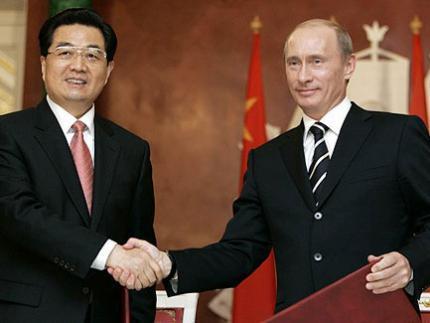
Vladimir Putin wrapped up a day of talks with Chinese leaders in Beijing on Tuesday and then attended the two-day meeting of the Shanghai Cooperation Organization. Observers say ties between China and Russia have seldom been better, and Global Times, a newspaper controlled by the Chinese Communist Party, wrote that the bond between the two countries “can be built into one of the pillars of international relations.” Did Putin finally cement a Sino-Russo axis?
The Dragon and the Bear continually boast of their “strategic partnership,” but they have never been as close as that term implies. More competitors than anything else, the two large states jockey for influence in the Middle East and Central Asia. They may even one day clash over Siberia, once governed by the emperors who ruled from Beijing. They see the world—and their respective places in it—differently. As independent analyst Bobo Lo wrote in the New York Times last week, their differing interests “ensure a relationship that is defined principally by its limitations.”
Lo’s assessment has been accurate up to now; since the end of the Cold War, Beijing and Moscow have seen their respective ties to the West as far more important than their own relationship, and they have let their differences dominate their relations.
Now, however, we are witnessing a new dynamic emerge. Today, both China and Russia are beginning to see their interests converge, especially because each seems to believe the West is finished. Putin apparently thinks it is more important to maintain good relations with Beijing than Washington.
After all, the Russian leader shunned a trip to Camp David in May to participate in the G-8 meeting there, and to Chicago to attend the NATO Summit, but he did participate in the Beijing-led Shanghai Cooperation Organization, the so-called “anti-NATO.” And there is no reason for Putin to have skipped the meetings in the US, as they were held more than two weeks before those in the Chinese capital.
In the past, it was most likely Putin’s prickliness that helped keep Russia and China apart. These days, he seems to have repented, signaling the possibility of a new era of cooperation between the two giants. “We do not have a single irritating element in our ties, but we have common interests,” Putin said in April. The most he was willing to admit to was that there were some matters requiring “additional attention.”
We should always be concerned when hard-line states, large or small, start to act in unison. And if this warming of relations between Putin and China’s Hu Jintao does foreshadow an alliance between the two authoritarian powers, then it marks a serious challenge to Washington and its democratic allies. We remember that the Soviet Union’s failure in the Cold War was preceded by China abandoning Moscow in that global struggle. Now, those forces could be joining up again, although political and economic strains in Russia and China could make their combination less formidable than in the past.
In any event, we should remember that America prevailed in the Cold War not because of Mao Zedong’s help but because the US stood for ideals that people around the world shared. And we still do, whether or not China and Russia form the new axis.
Photo Credit: www.kremlin.ru
June 4, 2012
America’s Friends in Asia
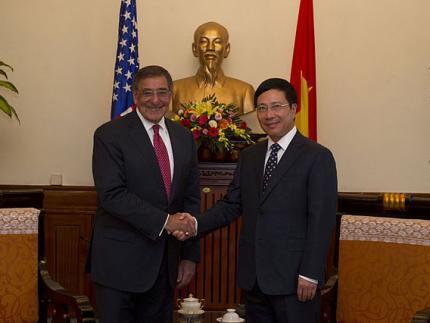
Leon Panetta toured Cam Ranh Bay on Sunday, becoming the first US defense secretary to visit that strategic port since the end of the Vietnam War.
In the words of one regional journalist, he crossed a “symbolic threshold” just by showing up. According to his public agenda, Panetta mostly talked about implementation of last year’s memorandum covering five routine matters—but observers are focusing on the symbolism of this visit to one of America’s many new friends in Asia, this one a former foe.
The trip takes on added significance because Panetta, on the preceding day in Singapore at a major security conference, gave substance to recent announcements by the Obama administration, explaining that the US would indeed shift naval forces to the Pacific, away from the Atlantic fleet. By 2020, he told the Shangri-La Dialogue, 60 percent of the Navy’s vessels will be deployed in the Pacific region. “The United States has long been deeply involved in the Asia-Pacific. Through times of war, times of peace, under Democratic and Republican leaders and administrations, through rancor and through comity in Washington, through surplus and through debt,” Panetta declared. “We were here then, we are here now, and we will be here for the future.”
With a few words, the defense secretary began to dispel doubts about America’s commitment to the region, which has become increasingly apprehensive of China’s new military boldness. There, many have been thinking along the lines of Chas Freeman, the Beijing-friendly ex-American diplomat. “I fear that the so-called ‘pivot’ to Asia will turn out to be an unresourced bluff,” he wrote in the National Interest this February. Panetta this weekend went a long way to convincing the doubters in Washington—and, more important, in the Pacific Basin—of America’s determination to maintain peace and stability in Asia.
And everyone knows why Washington has to do that: China’s rapid naval buildup and its aggressive actions in surrounding seas. Beijing did not send Defense Minister General Liang Guanglie to this weekend’s Shangri-La Dialogue, but that does not mean it was silent on pressing issues. On Monday, Chinese Foreign Ministry spokesman Liu Weimin asked America to respect Beijing’s interests in the region. Yet Panetta’s so-far triumphant tour of Asia is demonstrating that Washington will not accept Chinese dominance of regional waters and will instead insist on freedom of navigation for all.
By not sending a high-level delegation to the Shangri-La Dialogue, Beijing showed it did not think much about interacting with the rest of East Asia, a sure signal of how alone it is in its own neighborhood.
Yes, China has friends too—but they are not ones to brag about. Beijing has a six-decade alliance with North Korea, and on Tuesday the unappealing Vladimir Putin starts a visit to the Chinese capital.
Photo Credit: Erin A. Kirk-Cuomo
May 30, 2012
Why North Korea Is Not Testing Its Nuke—For Now

In both 2006 and 2009, North Korea followed long-range missile tests with detonations of nuclear devices. In the middle of last month, the North launched a “rocket” supposedly carrying an earth-observation satellite, the Kwangmyongsong-3.
Last week, a South Korean “senior government official” told Yonhap News Agency that the North is “technically ready” to test a nuclear weapon. So will Pyongyang continue its pattern and detonate a device soon?
At the moment, the North is making a big show of cooperation. The Foreign Ministry in Pyongyang informed the United States in recent weeks that it is “refraining” from provocative actions and has no plans to conduct a nuclear test. The North, according to an unnamed spokesman, is even open to negotiations on its atomic arsenal.
China, Japan, and South Korea this month demanded that North Korea stop provocations, and the US appears to have been involved in extraordinary diplomacy in this regard. According to reports, not denied by the State Department, two American officials traveled to Pyongyang for meetings on April 7th. Their “secret mission” was supposedly to head off the launch that ultimately took place on the 13th of that month. Observers, therefore, have judged the dialogue a failure.
Was it? At the time, the Obama administration surely wanted to stop the launch—thought to be a cover for the test of a missile. Yet the White House may have assumed that the North was going to test no matter what, especially because the launch was timed to coincide with the 100th anniversary of the birth of North Korean founder Kim Il Sung. If Washington were operating under that assumption, the trip could have been an attempt to stop a nuclear detonation following the lift off of the rocket.
It seems that the White House is doing all it can to salvage the so-called Leap Day Deal, a bilateral agreement between Washington and Pyongyang involving moratoriums on long-range missile and nuclear activities. The May 24th edition of the Nelson Report, the Washington insider alert, even refers to the possibility of a second secret mission. Early this month, the North Koreans apparently used informal channels to tell the Obama administration that they wanted to continue talking. Perhaps the delay in the test is designed to get aid from Washington.
It would seem, however, that the North Koreans might conduct a nuclear test sometime this year. For one thing, the regime needs to make up for the April launch, a humiliating failure.
Moreover, North Korea is thought to be selling its nuclear technology to Iran. If that is the case, a third nuclear test could be a helpful demonstration for the North’s Tehran customers. Speculation is that the next test might be of a uranium device, which could be of special significance because Iran is enriching uranium.
There is another factor as well. Kim Jong Un might think that a test will intimidate the South Korean electorate into voting for a “progressive” candidate in this December’s presidential election. The young dictator surely wants a progressive to win, so that Seoul will resume desperately needed aid, which conservative President Lee Myung-bak has cut off during his term.
If there is a test, expect it to be timed to hurt the ruling conservative Saenuri Party, which looks like it just might win at the end of the year—absent any disruptive provocations from Pyongyang.
May 20, 2012
Should the US Ratify the UN Sea Treaty Because of China?

The White House’s recent campaign to ratify the UN Convention on the Law of the Sea is beginning to focus on China. Administration figures, backed by the Pentagon, maintain that the pact, also known as the Law of the Sea Treaty, or LOST, will give us one more tool to deal with Beijing.
The argument was outlined by Leon Panetta on the 9th of this month as he listed five reasons for ratification. The last is that the treaty “would strengthen our position” in “the strategically vital arc extending from the Western Pacific and East Asia into the Indian Ocean region and South Asia.” In this area, “numerous countries”—the defense secretary did not utter the word “China” in this context—“sit astride critical trade and supply routes and propose restrictions on access for military vessels.” And then he asked, “How can we argue that other nations must abide by international rules, when we haven’t officially accepted those rules ourselves?”
The Christian Science Monitor, less diplomatically, put it this way while arguing for ratification: “It might help bring China into honoring the international norms of the sea.”
There may be many reasons to ratify the convention, but China is not one of them. There are two points to consider. First, although Beijing ratified the pact in June 1996, it continues to issue maps claiming the entire South China Sea. That claim is, among other things, incompatible with the treaty’s rules. It’s no wonder Beijing notified the UN in 2006 that it would not accept international arbitration of its sovereignty claims.
China’s expansive claims highlight a fundamental point: agreements are virtually useless when dealing with hard-line states. Since the death of Mao, the People’s Republic of China has almost never hesitated to sign and ratify pacts, conventions, and treaties—and at the same time violate them.
It is, for instance, a signatory to the Nuclear Nonproliferation Treaty but remains a notorious nuclear proliferator, and it is a member of the World Trade Organization yet brazenly disregards its trade obligations. And UN sanctions? China openly violates those too, even though it is one of the five permanent members of the Security Council.
The theory that China can be brought into the international community by enmeshing it in a global rules-based framework has, unfortunately, not been validated by recent history. If anything, Beijing has, from the inside, made global institutions weaker as it pursues interests that are inimical to a liberal, international system.
Second, the United States does not need the treaty to enforce freedom of navigation on the high seas. In fact, the US Navy was doing that before there was a UN Convention—and even before there was a UN. Indeed, if there has been a consistent theme of American diplomacy since 1775, when America’s navy was first established, it has been to proclaim and to help maintain the right of safe passage through international waters. And today, as a result, supertankers and rust buckets alike ply global trade routes without armed escorts, regardless of the flag they fly, because the US Navy and its allies ensure the world’s sea lanes remain open. A treaty with China won’t change that.
“By moving off the sidelines, by sitting at the table of nations that have acceded to this treaty, we can defend our interests, we can lead the discussions, we will be able to influence those treaty bodies that develop and interpret the Law of the Sea,” Panetta said in his May 9th remarks. True, but the rules themselves are not the issue when it comes to China. When it comes to China, it’s the enforcement that counts.
And enforcement of Beijing’s obligations by this administration and the preceding one has been notoriously lax. What is the point of America participating in the making of rules when no White House will demand that the Chinese adhere to them?
May 16, 2012
What Does a Suicide Bombing Say about Unrest in China?

Last Thursday, a Chinese suicide bomber killed three bystanders in a protest over the forced seizure of the bomber’s home by a local government in Qiaojia County, in southwestern Yunnan Province. According to local newspaper reports, the bomber was a woman from Pingzi, a village in the mountainous Baihetan township, who rapped explosives in the clothes of her 15-month-old baby and detonated them while inside a government office that had demanded she sign over her land. Two of the dead were officials. Sixteen others were injured.
The authorities in Qiaojia initially refused to admit the explosion was caused by a suicide bomber and promised to find and punish the perpetrator. The government also set up a taskforce to investigate.
The official Xinhua News Agency has been more forthcoming. It now acknowledges that the explosion was caused by a suicide bomber but claims the perpetrator was a 26-year-old male, Zhao Dengyong. Authorities say they found Zhao’s DNA at the office and have footage of him arriving at the scene.
This version of the truth, however, is questionable. For one thing, Zhao was not known to have any grievance against the local government. Moreover, no witness has placed him at the scene. For instance, Li Weiyou, whose wife was among those killed, does not recall seeing anyone matching Zhao’s description.
Finally, Zhao was from a different township, which is 100 kilometers away from the bombed government office. Villagers, therefore, have questioned the official account. As one of them told the South China Morning Post, “Why would an outsider choose to come to this remote place to set off a bomb?”
The incident is believed to be the first of its kind in China. “It is common to see people committing suicide in protest over forced evictions, but the suicide bomber in Yunnan represents a shift of public attitudes,” notes Tang Jingling, a human rights lawyer from Guangzhou, the capital of Guangdong Province. As Tang notes, in the past people just gave up but now they are coming to the view that it is right to take the lives of rapacious officials.
And the Chinese people evidently agree. Netizens have called the bomber, whose name is not known, a “heroine” and a “pioneer defending rights.” As one microblogger wrote, “When laws can no longer extend justice, this behavior is the most righteous.” And as one woman in Qiaojia County told the Post, “I would have done the same thing.”
It was just a matter of time before there was an incident like this. Officials in the area have been seizing land since 2004, and villagers have been upset that the compensation paid by local governments was much less than what those governments received from selling their land. Recently, Ding Fachao, from Laodian village, in Qiaojia, protested a forced demolition and was killed. Residents blame officials. He was taken to a government office on April 17th and died the following day.
Throughout Chinese history, patriotic officials have taken their lives to bring the plight of their country to the attention of the emperor, and one of China’s holidays, Dragon Boat Day, in the spring, commemorates the death of Qu Yuan in the Zhou Dynasty, the most remembered of these gruesome events.
These days, the apparent increase in suicide protests is evidence of the failure of the Communist Party to control its own officials. If party leaders cannot curb rampant abuses at the local level, we will likely see not just suicide bombings but mass uprisings.
Photo Credit: Ariel Steiner
May 7, 2012
Helping China Build a Stronger Military
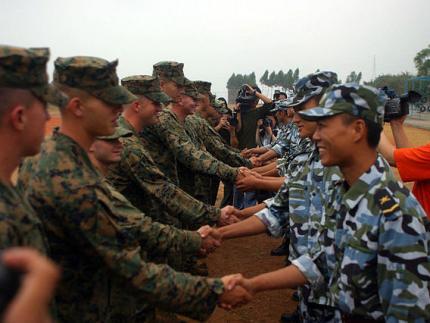
On Friday, Chinese Defense Minister Liang Guanglie arrived in the US for a six-day visit. He started out by saying that his country and America are not competitors. That’s a good thing, because during his stay he is getting a look at, among other things of value, advanced Navy and Air Force hardware.
Liang has already been to Naval Amphibious Base Coronado, in San Diego, where he toured a destroyer. By the time he leaves, the burly defense minister will have also inspected Southern Command in Florida, Fort Benning in Georgia, Camp Lejeune in North Carolina, and West Point.
Bill Gertz of the Washington Free Beacon suggests the Obama administration, by showing sensitive sites to Liang’s delegation, may be violating Section 1201 of the National Defense Authorization Act for Fiscal Year 2000, which prohibits exchanges with China that “create a national security risk due to an inappropriate exposure” in 12 areas enumerated in the statute.
Clearly, the US has disclosed substantially more than China has during decades of reciprocal visits, and the continued one-sided nature of this process is troubling. Proponents of these visits nonetheless say the disclosures can intimidate the Chinese by convincing them they cannot prevail in any actual conflict. That’s a great theory, but the flag officers of the People’s Liberation Army have known that for six decades.
In any event, the real purpose of the lopsided disclosures is to build mutual trust. “What I’m hoping is that we can establish at least a process whereby we can communicate with one another on a peaceful basis,” Secretary of Defense Leon Panetta said on Thursday, on the eve of Liang’s arrival.
Judged by this standard, decades of visits have been a dismal failure. The Chinese, for instance, are resistant to establishing any rules-of-the-road maritime agreements, such as the ones America had with the Soviet Union.
Coordination is especially difficult. Beijing broke off military ties in early 2010 over Washington’s announcement of arms sales to Taiwan. Relations were resumed in time for China’s flag officers to insult, if not humiliate, then Defense Secretary Robert Gates during his trip to Beijing in January 2011.
The essential problem is that the Chinese can sense desperation in Washington. There, policymakers want to avoid the conflict that accompanied the rise of Germany and Japan in the last century and believe that dialogue can do the trick. Yet as American administrations have tried harder to talk to China, the Chinese have pulled back. This has led to the unusual exposure that visits like Liang’s allow.
You would have thought that American generals and admirals—not to mention Washington policymakers—understood the basic truth that in any relationship, power almost always rests with the less-interested party.
“There are a lot of issues we have to discuss,” Secretary Panetta said on Thursday. Yes, he listed North Korea, freedom of navigation, humanitarian assistance, and nuclear proliferation—and could have added a few more. In fact, there seem to be additional issues every month, as China’s international behavior becomes markedly more aggressive.
But after decades of failed discussions, it’s obvious we can accomplish more with China if we stopped pursuing the Chinese so ardently. But then, apparently no one in Washington can grasp even the most basic principles of human relations.
April 30, 2012
Defending Chen Guangcheng is Defending the US
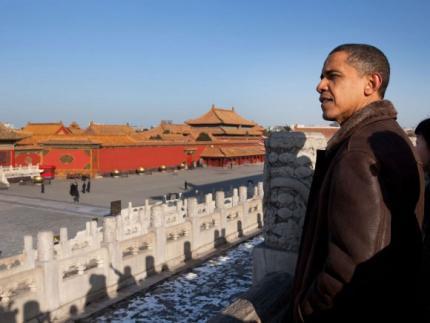
On Sunday, John Brennan commented on the news that Chen Guangcheng, the blind activist who made a daring escape from illegal house arrest, had found refuge in the American Embassy in Beijing. “We’re going to make sure that we do this in the appropriate way and that appropriate balance is struck,” the White House chief counterterrorism adviser told Chris Wallace on Fox News Sunday, referring to negotiations with China. The US, he said, would “balance our commitment to human rights” while continuing “to carry out our relationships with key countries overseas.”
How can anything be wrong with a “balanced” approach? Brennan used essentially the same formulation that Secretary of State Hillary Clinton articulated in February 2009. Then, she signaled that the Obama administration would balance human rights concerns with other considerations. The Chinese, taking her comments as a sign of capitulation, went on a foreign policy bender. They even felt emboldened to attack a US Navy vessel in international waters the following month. So the White House should have learned its lesson.
It hasn’t, obviously. But then, no American administration has got its China policy right. Every time there is some “incident” involving that country, American policymakers worry that it will upset relations. Then Chinese leaders throw tantrums to obtain maximum advantage. You would think that after four decades we would have caught on.
We haven’t. Now, everyone seems worried that the Chen matter will derail the two-day Strategic and Economic Dialogue, which begins on Thursday in Beijing with Secretary Clinton, Treasury Secretary Timothy Geithner, and a planeload of American officials. This set of meetings, which stretches back to 2006, has produced little progress, especially considering the effort Washington has devoted. So why should we be concerned that this round of talks might somehow fall apart over Chen? Almost no one was expecting substantial progress from these discussions, anyway.
Nonetheless, the State Department is treating the Chen matter as a crisis. Yes, it is a crisis, but not for us. It is a crisis for China’s Communist Party because it is fracturing at the same time the economy is faltering, the authority of the central government is eroding, the military is breaking free of civilian control, and the Chinese people are engaging in violent protest. In other words, the wheels are coming off.
The country has progressed about as far as it can within its existing political framework. Reagan was right: the nature of these regimes matter. What makes the Chinese one such a human rights abuser at home makes it an irresponsible power abroad. So by defending the human rights of the Chinese people, we are, in a real sense, also defending our national security. It’s time for the Obama administration—and the Republicans, for that matter—to view the Chen incident as an opportunity to discuss the real reasons why we have troubled relations with China’s communist state.
April 25, 2012
Washington’s Soft Line on Chinese Weapons Sales

On Friday, the New York Times revealed that the Obama administration is planning to relay to Beijing its concerns about the apparent sale by a Chinese enterprise of six missile-transport vehicles to North Korea. The eight-axle TELs (which stands for transporter-erector-launchers) were spotted in a Pyongyang military parade on April 15th, hauling what looked to be a new long-range missile.
An unnamed White House official, speaking to the Times, noted that the Obama administration believes China sold the chassis and other parts for the missile-transport vehicles but that the transfer did not constitute a clear violation of Security Council measures imposed in 2006 and 2009. “We think this is poor Chinese performance in sanctions implementation, and not willful proliferation,”said the official. “The Chinese system is so sprawling and poorly organized that they are not good at enforcing sanctions.”
In one sense, it is right for the Obama administration to be initially cautious, as we do not at this time know exactly how the North Koreans came into possession of the launchers. Yet, on the other hand, it is premature—reckless, even—to immediately come to the conclusion that China merely sold the chassis and that its proliferation has not been “willful.”
In fact, there are many reasons to suspect that Beijing’s proliferation has been with malice aforethought. For one thing, why would North Korea have to buy a chassis from China if it in fact had developed, on its own, a sophisticated missile and the intricate launcher assembly? It makes more sense to believe that Pyongyang bought the whole package, the missile and its associated launcher, from China. And Richard Fisher, of the International Assessment and Strategy Center, points out that China has sold similar missiles and TELs to Pakistan.
Unfortunately, Beijing appears to have stepped up its transfers of ballistic missiles in the last few years, as reports of sales to Iran indicate. Moreover, it is hard to conceive how Beijing could have thought that its sale of the vehicle would be for peaceful purposes when it is configured for only one purpose, the launch of multi-stage missiles. In any event, the seller of such expensive items—about $1 million apiece—would generally know its clients and their intentions.
This sale to Pyongyang does not appear to be an isolated matter. As Anthony Cordesman of the Washington-based Center for Strategic and International Studies told CNN, “There is no question that there is a long history in the past of Chinese and North Korea cooperation on missile technology.” We should not be surprised, because for decades Beijing has been the world’s arch proliferator of missiles and nukes. In short, it stretches credulity to believe that this was an “off-the-shelf” sale to an anonymous customer for peaceful purposes.
Ted Parsons, of IHS Jane’s Defense Weekly, said that such a sale “would require approval from the highest levels of the Chinese government and the People’s Liberation Army.” That conclusion sounds right, but even if it were not, Beijing should still be held accountable for the sale of the vehicle, as it has undertaken international obligations that bind all inside China.
In any event, Chinese diplomats ensure us that a rogue sale cannot happen in their country. “We have our own export-control regime, which has been strictly implemented by all agencies and ministries of the Chinese government,” noted Geng Shuang, Chinese embassy Embassy spokesman in Washington.
If we want China to stop supplying North Korea with weapons technology, we need to give Beijing the right incentives. Making up implausible excuses for the Chinese is not the way to change exceedingly irresponsible behavior.
Gordon G. Chang's Blog
- Gordon G. Chang's profile
- 52 followers



